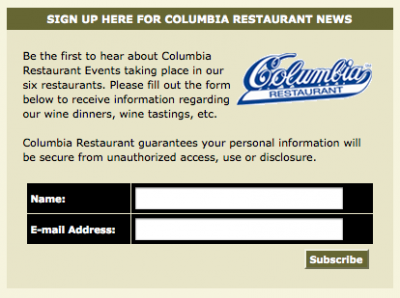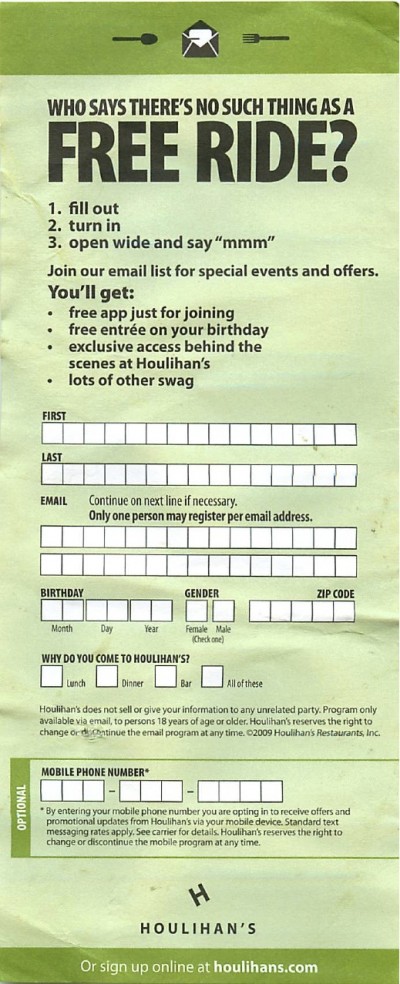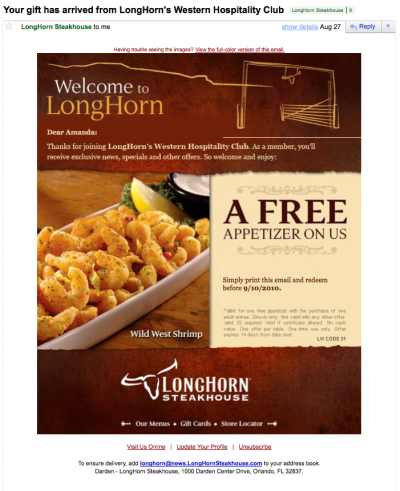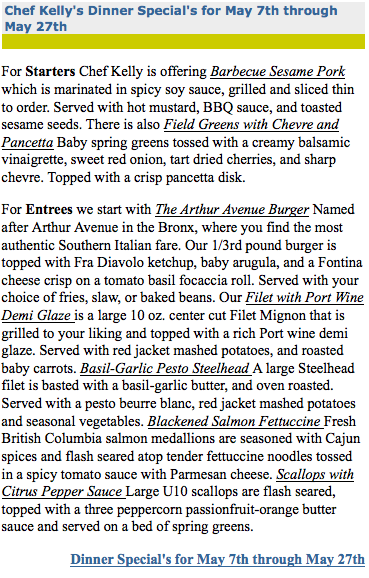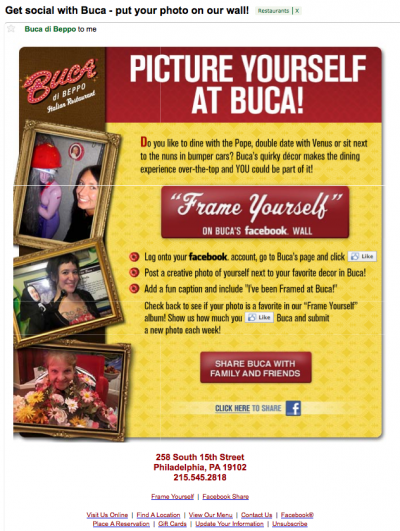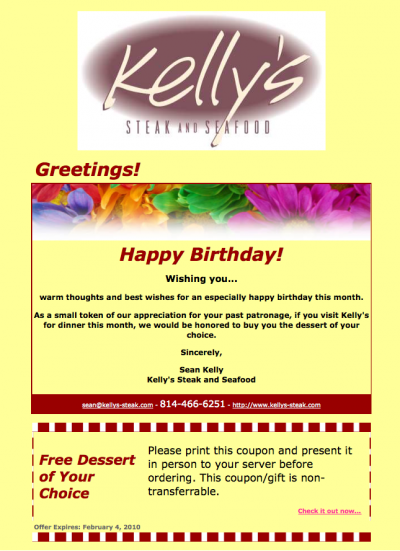What Email Marketing Can Do For Your Restaurant
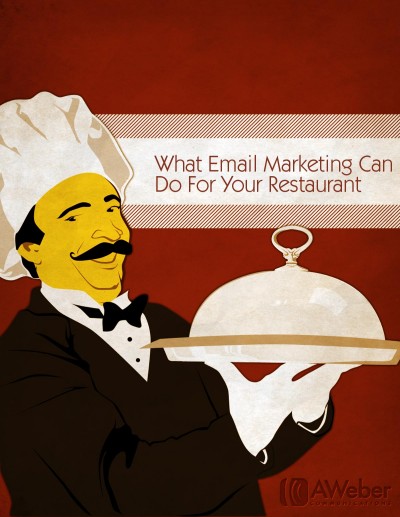
Getting a customer in the door for the first time can cost a pretty penny.
Consider the price of advertisement – each payment for design, printed materials or ads means you’ll need more diners just to break even. Coupons can get customers in the door, but they can also seriously dent your profit margin.
And not all of those first-time customers will choose to come back – they might not dine out much or they didn’t have a great first experience.
Your solution? Cultivate a regular base of repeat customers. They bring in revenue without the cost of acquisition. Not only does this lower your cost per visit, but “regulars” often deliver free, effective advertisement by word of mouth.
This is easier said than done, however. You may offer delicious food and a pleasant ambiance, but memories of good meals fade and there are plenty of other restaurants out there.
Many restaurants cross their fingers and hope diners will come back on your own, but you know better. You’ve found a better solution – email marketing – and that’s why you’re reading this guide.
Why Coupons Aren’t Enough
When choosing how to market, it seems natural to start with what hits your subscribers’ pockets. For restaurants, this means limited-time coupons and specials: weekly specials, birthday specials, holiday specials, and so on, and so on…
Coupons are a great way to provide a particular of incentive for a visit to a restaurant, but remember that if all customers are looking for in a restaurant is value in a calories per dollar sense, they’ll choose the fast food joint every single time.
What Works Even Better
What really makes your restaurant special? It has unique selling points that other establishments don’t. Those points are what will bring customers back. So consider what those points could be:
- Are your desserts prepared with five-star flair?
- Do you offer seating options that other places can’t?
- Does your chef have experience with exotic cuisines?
That personal touch is what customers will come back for. But they may not notice your uniqueness on their first visit. Even if they do, you could drop out of mind over time.
That’s where your email campaign comes in. Sending emails on a regular basis reminds customers that you’re an option. Highlighting your unique selling points in those emails shows them just how good an option you are.
And with that, you can take a customer’s first impression and transform it into lasting loyalty. This loyalty leads to return visits, reducing your costs of advertising to new customers. And it’s all possible with email marketing.
Sounds Good. But…How?
Keep reading. In this document, you’ll find ideas concerning ways you can effectively use an email service to not only set yourself apart from the giants but also the competition right next door on your block.
You’ll learn how to convert first-time diners and visitors to your site into subscribers. Then you’ll learn how to create messages that keep them coming back for more.
Step 1: Collecting Subscribers to Market To
Your restaurant may have many wonderful qualities to advertise, but it won’t do any good if you don’t have an audience to market to!
So your restaurant’s email marketing campaign begins with finding people to voluntarily sign up for your emails. These people, called your subscribers, will be automatically enrolled in your follow-up series and receive broadcasts as you send them. With those emails, you can prompt purchases. So where and how can you find these people?
On Your Web Site
If you have a web site, you’re already a step ahead! You already have a place where people who are interested in your establishment are milling around.
This is a perfect opportunity to present them with a sign up form. Explain that they’ll get more information and offers emailed directly to them. Then ask them to enter their email address.
As a restaurant, you should put your sign up form in at least two places:
- Your homepage
- Your menu page (if you have several separate pages, all the better – get the form on each of them)
Ideally, you should have a sign up form on every page of your site. But if you need to choose only a few, those are good places to start.
In Person At Your Restaurant
Many restaurants bring comment cards to their patrons with the check. Those cards can be a perfect place for an email signup form.
Be sure to bring a pen with the check, too – even before you know if the customer is paying by credit card. That way, they can pass the time (while the server brings them their change or runs their credit card) by signing up to your email list!
With Takeout/Delivery Orders
Slide a card promoting your email campaign into your takeout and delivery orders. Simply put your site URL on it and tell people to go there to subscribe.
Or for a twist, ask them to fill out a form on the card and bring it in on their next visit. This method has an added bonus – you can draw more attention by offering an incentive to subscribe, like a coupon!
On Menus and Other Promotional Pieces
Do you offer paper menus for customers to take away? If so, mention your emails on them.
As with the takeout cards, you may want to have people fill out something in person and then bring it back to your restaurant – that way, they have an extra incentive to come back (to drop off the card and get whatever bonus you’re offering new members)!
When People Make Reservations
You don?t have to wait for customers to finish their meals before offering an email signup. Actually, you don’t even have to wait for them to arrive at your restaurant!
Someone making a reservation is identifying him or herself as a customer, someone especially interested in your restaurant (compared to, say, someone who happens to visit your website but is not yet committed to coming in).
Sites like OpenTable know this, and offer diners the chance to sign up to restaurants? email lists when making reservations. If you take reservations on your site, you should be doing so, too. Just put a sign-up form on your reservations page.
If you take reservations by phone, keep a notepad near the phone or a spreadsheet on the computer for addresses. You’ll want to import them into your subscriber list regularly, so they start getting your emails before they forget that they signed up.
Step 2: Creating Your Marketing Emails
You’ve got your lists set up. You’re broadcasting menu changes, special events and coupons. Your regulars are responding and new customers are subscribing.
What should you do next?
It might be time to take a look at creating static items: things that appear in every email. What can you add to fill your tables with more hungry customers?
House Classics: Items You Should Always Include
Menus
Link to them! A surprising number of restaurants don?t have their menus listed online. Describing your dishes can convince even frequent diners to come in for that interesting new combination or a mouthwatering old favorite.
If your restaurant doesn’t have a web site, you can create and post your menu here.
Directions
Provide a link to driving routes, tips on parking, and public transportation information.
Take the guesswork out of getting there, and new customers may become regulars.
Gift Cards
If you offer them, say so.
People are always looking for gift ideas, and are likely too wrapped up in the dining experience when on site to seek them out.
Reservations
If you accept these, provide a link to a reservation page on your site, like this, or display your phone number.
Even if your number is listed elsewhere, seeing it listed for reservations suggests that subscribers call it for that reason.
Hours of Operation
When customers get your updates about happy hour discounts, lunch specials or live music events, they can glance over to your hours to see just when to plan their visit.
This saves them the hassle of searching for your hours on your web site or showing up to an empty, dark building.
Calendar of Events
After you announce a Tuesday-night open mic or a Sunday dinner discount, list it on a calendar. In each email, link to the calendar or just provide the next week?s schedule.
Taleo’s Bill of Email Fare
Our friends over at Taleo Mexican Grill in Irvine, California have a recipe for a well-done newsletter with lots of helpful static items. Take a look!
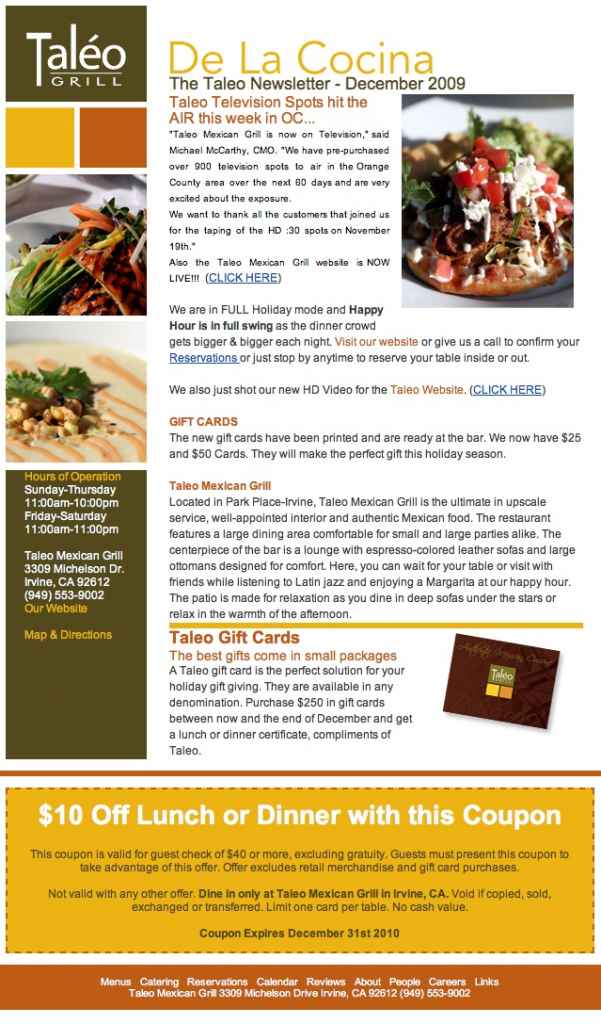
Seasonal Dishes: Feature These Now and Then
Pictures
If a picture is worth a thousand words, then a picture of colorful, tasty food is worth a thousand tummy-grumbles.
Wild cravings for your food might be the best enticement of all.
(And tag them. Tagged pictures can bring in traffic from search engines. Using quality, well-tagged pictures can drive traffic to your site.)
Coupons
Relying on frequent coupons won’t bring you much business for two reasons: it teaches customers that there’s no urgency to visit now and it can seriously damage your bottom line.
Sprinkling them here and there in a larger campaign can boost business, though. By sending them only to subscribers, you limit discounts to people who are more likely to come back. You also build their loyalty by giving them something exclusive.
Plus, they’ll keep checking your emails to see what else you’ll come out with!
Peeks at Company Culture
Many restaurants send emails that invite subscribers to come visit, but forget to introduce themselves first! Give your readers a peek at who you are as a company every so often.
Introducing a new staff member. Share pictures of a special event. Highlight a new and unusual ingredient. This not only makes your content more interesting, it gives your readers the feeling that they’re part of your team.
Meet the Chef: A Relationship-Building Strategy
We’ve established that there’s more to an email campaign than economic incentive. You need to build a relationship that establishes unique selling points to cultivate a return customer base.
In most restaurants, the gap between the kitchen and the front end is as thick as the drywall that separates them.
Imagine instead, having your chef come out to greet every table at your restaurant, serving dishes to your customers, explaining the freshness of the ingredients and the uniqueness of the plate.
Let’s look at how introducing your chef can add a personal face to your email campaign.
Unfortunately, your chef has plenty on their hands, like, well, cooking. They don’t have the benefit of a production crew or the time to leave the kitchen every 5 minutes to greet each customer.
Luckily, if you’re collecting customers’ email addresses at your restaurant for your email list, you have options.
“Notes From The Kitchen” That You Could Send
Your chef could:
- write a “Meet the Chef” message with a personal introduction
- share anecdotes from their culinary experience
- tell a story behind the creation of a dish
- explain the nuances of a dish and provide a special coupon for it
- provide an exclusive recipe
- narrate a day of cooking at your restaurant
- introduce cooking staff and give a tour of the kitchen
- give nutritional information on your dishes
The list of ideas can go on and on. You’ll want to keep your email short and sweet, so you might even consider starting a series of messages.
How to Handle the Project
The first step is determining how involved your chef will be. Consider their schedule – are they consistently swamped in the kitchen or can they spare a few minutes? Consider their level of interest – how involved do they want to get?
Then create a plan that accommodates their needs. Here are some questions to get you started:
- Does your chef want to be featured just once or regularly throughout your email campaign?
- How often would they contribute?
- Would they want to write messages themselves?
- Would an interview-style report work best?
- Could you interview them on camera, then link to the video in an email?
- Would they rather just offer a quote or two for each topic you choose? You could pair their quotes with
images or work them into a paragraph yourself.
By creating a personal message and sending it out over email, you deliver the impact of dozens of personal conversations while only spending the time it takes for one.
Reviews and Testimonials
Customer opinions can be powerful testimonials. You can get these from comment cards, emails of appreciation and sites like Yelp and OpenTable.
Consider publishing a response or two per email, possibly in a sidebar, to provide some social proof of your value.
Chef’s Specials
If you feature daily specials or if your menu is prix fixe, describe the day’s dishes through email. Share the delicious details, and your readers won’t be able to resist for long!
Loyal Customer Rewards
Customers can earn free menu items at many eateries with punch-for-every-purchase cards.
You can save them the hassle of carrying the card around – and go green – if you integrate your CRM with your email service. (Several email service providers offer ways to do this.)
When a customer hits a certain number of visits in your database records, you can automatically email them a voucher to use at your restaurant.
Invitations to Events
If you’re having a karaoke night, celebrating at a festival or ringing in the holidays with a special event, email about it.
Telling your subscribers not only keeps them in the loop, it means you’ll have a bigger crowd to feed on the big day.
Summons to Your Social Profiles
Social networks have quickly developed into another advertising medium – one that works hand-in-hand with email nicely.
If your restaurant has a presence on social media sites, send out an email to let your subscribers know they can find you there.
Even better, take a cue from Buca di Beppo: give your patrons a chance to show off. They’ll want to share their activity with their family and friends, giving you even more exposure!
Keep Your Presentation Neat
If you choose to add more than a few of these items, organized things neatly to keep from overwhelming your readers.
Go for a complete, but not cluttered, layout. Decide which items are most important, and make sure they’re available above the fold, or the point where readers would have to scroll down to see more.
Heat Up Your Sales With Targeted Timing
Since you’re selling a dining experience, your subscribers’ interest is going to largely depend on their appetite. So for in-house events or special deals, you’ll reap a bigger response if you’re particular about your timing.
If the promotion you’re creating is a one-time broadcast, schedule it to go out at the most appropriate day and time. If it’s part of a automated follow-up series, set parameters so it can only be sent during an appropriate interval.
Here is what your email scheduling might look like:
Monday – Friday mornings
Subject: Buy a breakfast sandwich and receive a free coffee
To promote a weekday, on-the-go breakfast special, you probably want to catch your subscribers early in the day, the first time they check their email.
By sending on a weekday, between 6 and 9 a.m., you’ll hit them right when they could really use some breakfast and a coffee.
Sunday – Thursday
Subject: Buy one dinner, get a second dinner at half the menu price
Sunday and weekday dinners are often relatively slow at restaurants, so your restaurant could provide a price incentive to help fill tables.
By sending any day from Sunday through Thursday, between 6 a.m. and 3 p.m., your discount can arrive in the inbox just when subscribers are setting up their dinner plans for the week.
Wednesday evenings
Subject: Free dessert on a bill of $25 or more
Send each subscriber a message giving them something for their sweet tooth to look forward to by scheduling this message for Wednesdays, again between 6 a.m and 3 p.m.
Thursday lunchtime
Subject: Get 20% off entire lunch bill with business card presented with check
By sending this message on Thursdays between 6 a.m. and noon, you can target subscribers the morning of the special, when they might be looking for the right location for that lunchtime meeting.
The days and times you choose for your sends will vary depending on what you’re trying to promote each time.
But one thing will stay the same: target your timing, and you’re more likely to see your subscribers appear in your restaurant as patrons.
Birthday Emails
Content they’ll love AND a way to build your list
A popular, tried and true way to boost return business throughout the year is to send a personalized birthday email to customers to demonstrate how you celebrate them individually.
Singling someone out from a group in a way that reminds them of their individuality can pay great dividends. And what better time of year to single someone out and make them feel special than their birthday?
A tailored and targeted offer can be just the thing to make someone feel special and remember us when they?re making the spending decisions surrounding their special times.
Some of us are also willing to spend (or have someone else spend) some extra money on things like gifts and special birthday dinners.
How To Make It Happen
Sending birthday emails is simple. You just need to collect people’s birthdays when they subscribe.
If they’re signing up in-house, ask for their birthday on the subscription cards that you pass out.
For people who sign up on your web site, you can simply add a field to your signup form asking for birthday information.
Then schedule monthly messages to celebrate the birthdays of each month!
How It Builds Your List
By giving customers another reason to get your email newsletter, advertising birthday specials can help you grow your list of subscribers in two ways.
First, surprising them with special incentives to return to your location boosts business and helps to maintain a profitable subscription.
Secondly, who celebrates a birthday alone? Everyone who joins the party is another potentially loyal subscriber and customer.
Two Ways That Email Can Sweeten Your Service
Customer Feedback
If diners leave your restaurant after a poor experience, even if they’ve had a good time there before, they may not return. They might even damage your reputation by talking (or blogging or tweeting) about their poor experience with others.
Whether you think this is an issue for your restaurant or not. In any case, these ideas should help you to identify hidden problems and work with your staff to fix them.
Step One: Identify Problems With Mini-Polls and Surveys
It’s probably not a common occurrence for people to scream bloody murder at your staff and storm out of your restaurant.
Instead, some customers will fill out comment cards – usually the people who feel compelled, for better or worse, to tell you about their experience immediately.
The problem is that not everyone feels so bold. And some may fear that the cards will never make it to management anyway.
That means many customers with complaints may not mention them at all. Instead, they leave politely. Then they don’t come back.
It can be a challenge to find out what was wrong if they aren’t around to ask. But with email, it is possible, and it?s the first step toward improvement.
The best way is to survey your customers directly. Here are two approaches you could take:
Set up an email address specifically for feedback
Set up an email account that you or your manager will check regularly. Print that email address on your comment cards and post it on your web site.
Respond personally to these messages. Your customers will appreciate the opportunity to be heard and your response, especially if you can make up for their complaint, may make them more likely to return.

Ask for feedback in a follow up
If you’re making it a point to connect with your customers through email, you have an excellent way to request quality feedback.
Just add a follow up message to be sent automatically to each new subscriber, asking them for comments on their experience at your restaurant.
Even if they don’t respond, you’ve added a personal touch to your campaign – one that shows your customers you care about their satisfaction.
Step Two: Use Results to Make Improvements
With the responses from your patrons, you should have a valuable and steady source of information that can help you improve the quality and consistency of your dining experience.
Training 2.0: Email for Employees
Education doesn’t end when you finish high school or college, and training shouldn’t end after your staff’s first two weeks. Whether it’s an updated menu or another birthday song, there’s always something new to learn.
Filling everyone in during regular staff meetings would be ideal, but it’s hardly possible. More than most other industries, food service is extremely fast-paced, and varying schedules make it very difficult to get every staff member in the same room.
So keep everyone on the same page with an employee email campaign.
Have your staff sign up when they join your team. Not only can you send them information about new happenings, you can also send:
- A series of messages highlighting issues that are universally important (eg. greeting customers, service policies)
- Weekly or monthly messages that highlight problems (and praise!) from customer comments
- The upcoming waitstaff and kitchen schedules
- Daily or weekly menu specials
Required Reading
You’ll need to determine the best way of encouraging your staff to read the messages regularly.
You can start by explaining that the messages are meant to help your waitstaff help themselves. Better performance and teamwork on their part means better tips – remind them of this.
You might also consider including a related question at the bottom of each message. Every time an employee answers a question correctly, give them points – eventually, they’ll earn a reward.
Ultimately, you’ll need to determine what motivates your staff best. Since many programs will show you who has read each email, you’ll be able to spot any trouble zones quickly and adjust accordingly. Since many programs will show you who has read each email, you’ll be able to spot any trouble zones quickly and adjust accordingly.
In Review
So how can email help you improve your service?
First, you obtain information by lending customers your ear, then use it to give constructive information to your staff. By doing this, you emphasize the service part of food service and create a consistent experience, leading to repeated visits from happy customers.
 87% off ends soon!
87% off ends soon! 